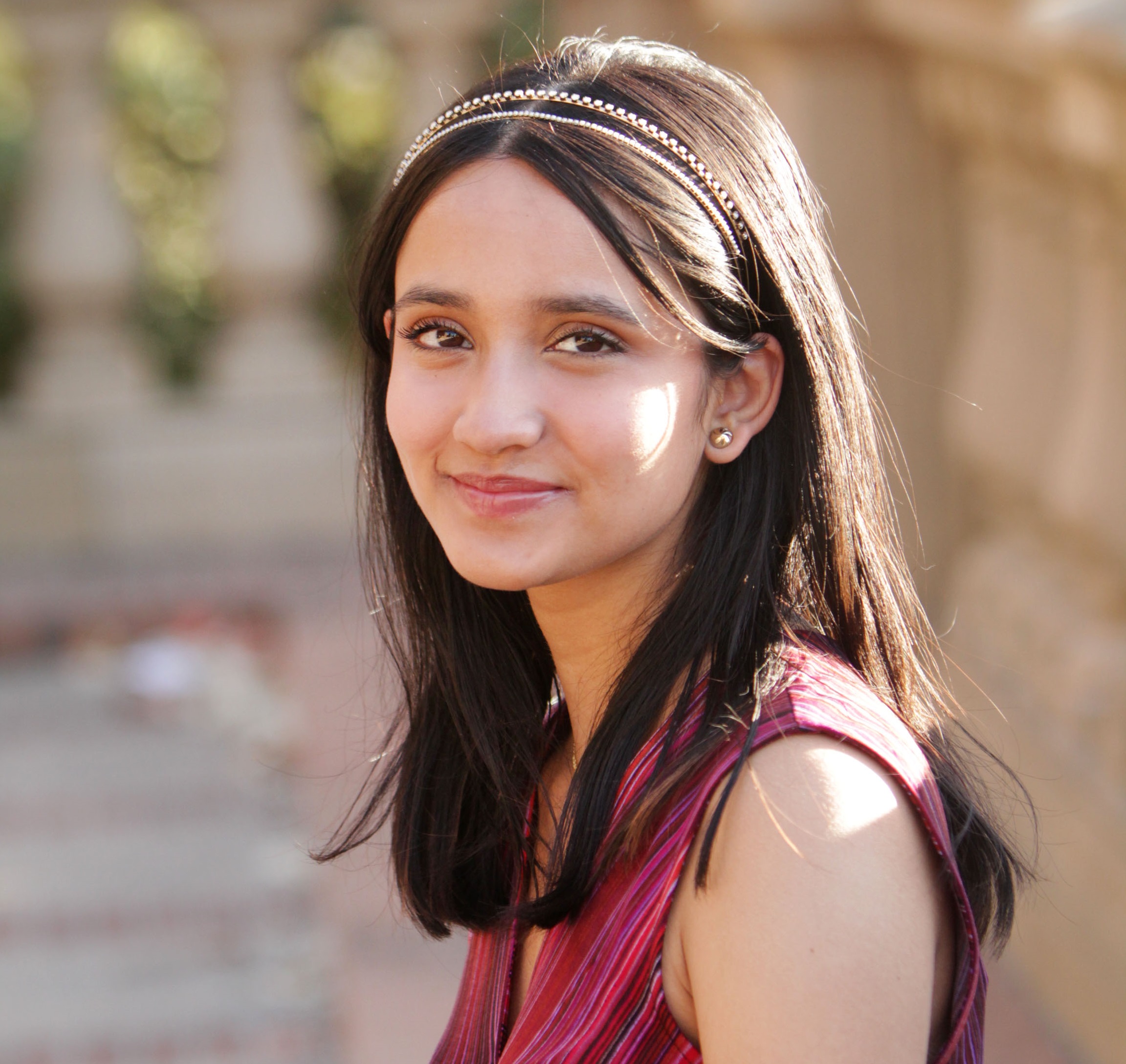Making a difference through the power of storytelling
UCLA undergraduate student Arushi Avachat on writing and publishing her first novel

Arushi Avachat, a third-year English and political science student at UCLA, will see her debut novel hit bookstore shelves in January 2024. | Photo by Haven Hunt
Lucy Berbeo | December 16, 2022
Now in her third year as an English and political science student at UCLA, Arushi Avachat is celebrating an extraordinary milestone: the forthcoming publication of her debut novel, which is set for release in January 2024. “Arya Khanna’s Bollywood Moment,” a work of young adult fiction inspired by Bollywood dramas from decades past, was picked up by Wednesday Books, an imprint of St. Martin’s Publishing Group at Macmillan.
Avachat, a Bay Area native who finished drafting the novel during her first year at UCLA, also works in political communications and as an organizer for progressive social causes. She spoke with the UCLA College about writing through the pandemic, navigating the publishing world — and why storytelling is a powerful means to create social change.
What was it like writing a novel while navigating life as an undergraduate student?
I finished the first draft of “Arya” during the winter quarter of my first year at UCLA. As a COVID freshman, writing my novel was often a meaningful escape from the stress and uncertainties of that time. Virtual school also meant I had a lot more time to devote to writing. I was able to write for several hours each day in addition to coursework, which would definitely not be possible anymore!
What does it mean to you to see your first book slated for publication? What were some of your inspirations and challenges on this journey?
It feels so exciting and still so unbelievable! I have wanted this for as long as I can remember. The biggest challenge for me was definitely finishing my first draft. I have been a writer for most of my life, and from middle school onward, I was never not working on a novel-in-progress — “in progress” being the operative phrase, as I inevitably abandoned each manuscript in pursuit of a new, shinier idea. It was one of my proudest moments to finally complete my novel. I found a lot of inspiration from prominent South Asian writers such as Sanjena Sathian, Roshani Chokshi and Sabaa Tahir, whose careers I deeply admire and who were all so generous with advice during my publishing journey.
How has your experience at UCLA influenced your journey as a writer?
My time at UCLA has completely reinforced my desire to pursue a career as a writer. I am a third-year English student, and I am hoping to concentrate in creative writing. The fiction workshops I’ve taken so far have been really rewarding — it’s so exciting to belong to a community of writers, and I’ve loved learning from professors who have built long-lasting careers for themselves as authors. Workshop has also forced me to write much more than I typically do. By nature, I am a very slow writer, and having to produce a new short story every week (while challenging!) has helped me get into the habit of writing daily — and being comfortable with bad first drafts.
What inspired “Arya Khanna’s Bollywood Moment,” and what do you hope readers will take away from your novel?
When I was fourteen, I wrote a short story about two sisters and their mother that I was very attached to. I felt like I had a lot more to say about those characters, and slowly, a novel idea started to emerge. I had the thought that I wanted this book to read like my favorite Bollywood dramas from the ‘90s and 2000s, and the wedding backdrop and cinematic structure evolved from there. My protagonist Arya’s older sister is home for the first time in three years to plan her wedding, and shaadi season is filled with family conflict, gossipy aunties and a rivals-to-lovers romance in the school setting.
Sisterhood is at the heart of this novel. While drafting, I spent a lot of time thinking about the moment when an elder sibling leaves home, and the younger sibling becomes a de facto only child. There can be a lot of resentment and messy feelings attached to this shift, especially if one’s home life is far from perfect. I wanted to explore this dynamic deeply. I also just had a lot of fun drafting this dramatic, hopeful, joyful book. I hope “Arya” will bring readers the same comfort that writing it brought me.
“In addition to creative writing, I have also worked extensively in political communications. Both fields have helped me realize how storytelling works to generate empathy, shape public opinion, and help people feel seen. I hope to contribute to this cause through my novels, which will always center the voices of Indian women, who remain largely underrepresented in literature.”
You’ve said that you see storytelling as an important means to achieve social change. Can you share more about this?
In addition to creative writing, I have also worked extensively in political communications. Both fields have helped me realize how storytelling works to generate empathy, shape public opinion, and help people feel seen. I hope to contribute to this cause through my novels, which will always center the voices of Indian women, who remain largely underrepresented in literature.
I was eighteen the first time I read a YA novel by an Indian author (“When Dimple Met Rishi” by Sandhya Menon), and I still remember the wonder and excitement I felt reading a story about a girl that looked like me. During my childhood, the books I had access to were overwhelmingly white, as was the publishing industry at large. Only recently has that begun to shift, and the young adult category in particular has led the charge in creating space for diverse stories.
I feel really proud to belong to that change. It’s so important for young people specifically to see themselves positively represented in media and to know they deserve to have their voices centered, not relegated to the sidelines as has historically been the case. I have much respect and admiration for the South Asian authors who came before me and made my career a possibility, and I’m hopeful that the book industry will continue to grow truly representative of its readers in the years to come.
What advice would you give to other young writers navigating the publishing world?
Really internalize the message that your publishing goals are a matter of when, not if. In an industry where nothing is guaranteed but rejection, and lots of it, it’s so important to have a strong sense of self-confidence in your work. I received over 40 nos from agents before receiving my first offer of representation. It was easy to get anxious during this time, but I kept reminding myself that I would always be a writer, and if not this book, then the next, or the next, would get me published. Having this mentality helped take some of the stress away from the process and kept my love for writing untainted by insecurity.
What’s next on your horizon?
It’s surreal to remember that this is just the beginning of my career — in so many ways, publishing “Arya” feels like a culmination of something; this is the end goal I have worked toward for so long. But I have so many more books left in me, and I feel so exhilarated by the variety of projects I have planned for the future. After “Arya,” I have a second young adult contemporary novel slated to release with Wednesday Books. Beyond that, I have ideas for a YA high fantasy, a YA historical fiction, an adult rom-com, and a middle grade contemporary. At some point in my life, I would love to write a murder mystery, too.
For more of Our Stories at the UCLA College, click here.


 Haven Hunt
Haven Hunt
 Courtesy of Jesse Rissman
Courtesy of Jesse Rissman